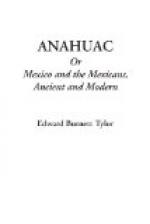In the morning we went off for an excursion, having got a lively young fellow from the hacienda in exchange for our stupid mozo. There was hoar frost on the ground, and the feeling of cold was intense at first; but the sun began to warm the ground about eight o’clock, and we were soon glad to fasten our great coats and shawls to our saddles. Three leagues took us to the town of Atotonilco[9] el Grande, which gives its name to the plateau we were crossing. Here we are no longer in the valley of Mexico, which is separated from this plain by the mountains of the Real del Monte. We rode on two leagues more to the village of Soquital[10] where, it being Sunday, we found the inhabitants—mostly Indians—amusing themselves by standing in the sun, doing nothing. I can hardly say “doing nothing,” though, for we went into the tienda, or shop, and found a brisk trade going on in raw spirits. Tienda, in Spanish, means a tent or booth. The first shops were tents or booths at fairs or in market-places; and thence “tienda” came to mean a shop in general; a derivation which corresponds with that of the word “shop” itself. Such of the population as had money seemed to drop in at regular intervals for a dram, which consisted of a small wine-glassful of white-corn-brandy, called chinguerito. We tasted some, while the people at the shop were frying eggs and boiling beans for our breakfast; and found it so strong that a small sip brought tears into our eyes, to the amusement of the bystanders. It seemed that everybody was drinking who could afford it; from the old men and women to the babies in their mothers’ arms; everybody had a share, except those who were hard up, and they stood about the door looking stolidly at the drinkers. There was nothing like gaiety in the whole affair; only a sort of satisfaction appeared in the face of each as he took his dose. It is the drinkers of pulque who get furiously drunk, and fight; here it is different. These drinkers of spirits are not much given to that enormous excess that kills off the Red Indians; indeed, they are seldom drunk enough to lose their wits, and they never have delirium tremens, which would come upon a European, with much less provocation. They get into a habit of daily—almost hourly—dram-drinking, and go on, year after year, in this way; seeming, as far as we could judge, to live a long while, such a life as it is. As we mounted our horses and rode on, we agreed that we had seldom seen a more melancholy and depressing sight.
We met some arrieros, who had brought up salt from the coast; and they, seeing that we were English, judged we had something to do with mines, and proposed to sell us their goods. The price of salt here is actually three-pence per lb., in a district where its consumption is immense, as it is used in refining the silver ore. It must be said, however, that this is an unusual price; for the muleteers have been so victimised by their mules being seized, either




